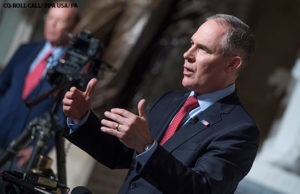Trump’s appointment of a climate science denier to a critical position shows us that we still have much to do to counteract climate change

Every so often, climate change denial insidiously makes its way back into newsrooms and political debates. Editorials fuelling the idea that climate change is a hoax will be published or politicians will confidently claim on national television that the science behind climate change is equivocal. However, the phenomenon has clearly reached a new and disturbing peak when such statements are made by the chief of the environment department of the world’s most influential country.
Last Thursday, Scott Pruitt, the head of the US Environmental Protection Agency (EPA), told US CNBC that “human activity is not a primary contributor to the global warming that we see.” He said that there is “tremendous disagreement” among scientists about the role of human activity in causing climate change. Of course, this flies in the face of well established science that shows human emissions have caused most observed warming since the mid-20th century. The scientific consensus—as summarised by the UN Intergovernmental Panel on Climate Change (IPCC), which provides regular assessments of climate science—confirms that human activity is the primary cause of climate change.
Pruitt’s record of toxic climate change denial has been under increasing scrutiny since January, when President Trump picked him to lead the EPA. Trump has gained something of a reputation as a climate change sceptic himself, with campaign trail comments about scrapping the US’s international climate commitments—one of his campaign pledges was even to abolish the EPA. On 17 February, the US Senate confirmed Pruitt’s appointment, despite controversies surrounding his links with fossil fuel companies and the fact that he has previously sued the EPA 13 times.
Pruitt’s recommendation in his CNBC interview was that the EPA should continue to review the evidence on climate change, as “we do not know yet.” This is as inappropriate as a public health minister calling for further research into the evidence between tobacco and cancer instead of taking action to reduce cigarette consumption. When science provides clear answers as to the causes of a disease, the logical next step is to consider the different treatment options and choose the most effective. This is the objective of “The Lancet Countdown: tracking progress on health and climate change” initiative, which highlights the most cost effective policies to address climate change and promote health, and tracks global progress in this.
Leadership from the US is all the more important since the road from the Paris agreement, which binds countries to limit climate change, is still being built. The international community is already on the decarbonisation path and neither Trump nor Pruitt can alter the overall direction of travel, but we risk not reaching our final destination quickly enough without clear support from politicians. Statements such as Pruitt’s do the exact opposite: they mislead the public and cast doubts in investors’ minds about the benefits of investing in a low carbon economy.
Instead, governments must recognise that tackling climate change is not only an environmental and medical emergency, but also a significant opportunity. The 2015 Lancet Commission called tackling climate change “the greatest global health opportunity of the 21st century.’’ The health benefits of acting and the health costs of failing to are substantial. Climate change is interfering with essential foundations of health by increasing the frequency and severity of weather events such as storms, droughts, floods, and heatwaves, and by spreading vector borne diseases such as dengue, malaria, and potentially emerging diseases such as the Zika virus.
By appointing climate science deniers to senior positions in his administration, President Trump is injecting climate denial straight into the heart of US executive agencies. The health community must work tirelessly to prevent and counteract climate denial: by communicating the evidence that links health and climate change and promoting science based interventions that protect and promote people’s health.
As Christiana Figueres so eloquently put it at the Lancet Countdown launch in November, “We should not let ourselves be distracted from our destination by vehicles parked on the side of the road with flashing lights.” This latest move from a climate change denier in a position of power should serve to remind us that—whatever the obstacles—we must keep our eyes on the horizon and defend our patients’ right to health.
 Nick Watts is the director of the UK Health Alliance on Climate Change, which brings together the UK’s major health institutions, including the BMA, The Lancet, the Faculty of Public Health, and the Royal Colleges of Physicians, Nursing, and General Practitioners. Nick is also the executive director of the Lancet Countdown: Tracking Progress on Health and Climate Change. Nick is a medical doctor who qualified from the University of Western Australia, and trained in population health (UWA) and public policy (University College London).
Nick Watts is the director of the UK Health Alliance on Climate Change, which brings together the UK’s major health institutions, including the BMA, The Lancet, the Faculty of Public Health, and the Royal Colleges of Physicians, Nursing, and General Practitioners. Nick is also the executive director of the Lancet Countdown: Tracking Progress on Health and Climate Change. Nick is a medical doctor who qualified from the University of Western Australia, and trained in population health (UWA) and public policy (University College London).
Competing interests: None declared.
 Pauline Castres is policy and communications officer at the UK Health Alliance on Climate Change. She has a strong background in public affairs and policy, previously having worked on health and food policy at the European Consumer Organisation (BEUC).
Pauline Castres is policy and communications officer at the UK Health Alliance on Climate Change. She has a strong background in public affairs and policy, previously having worked on health and food policy at the European Consumer Organisation (BEUC).
Competing interests: None declared.
Acknowledgement: With thanks to Isobel Braithwaite for her help on this article.
